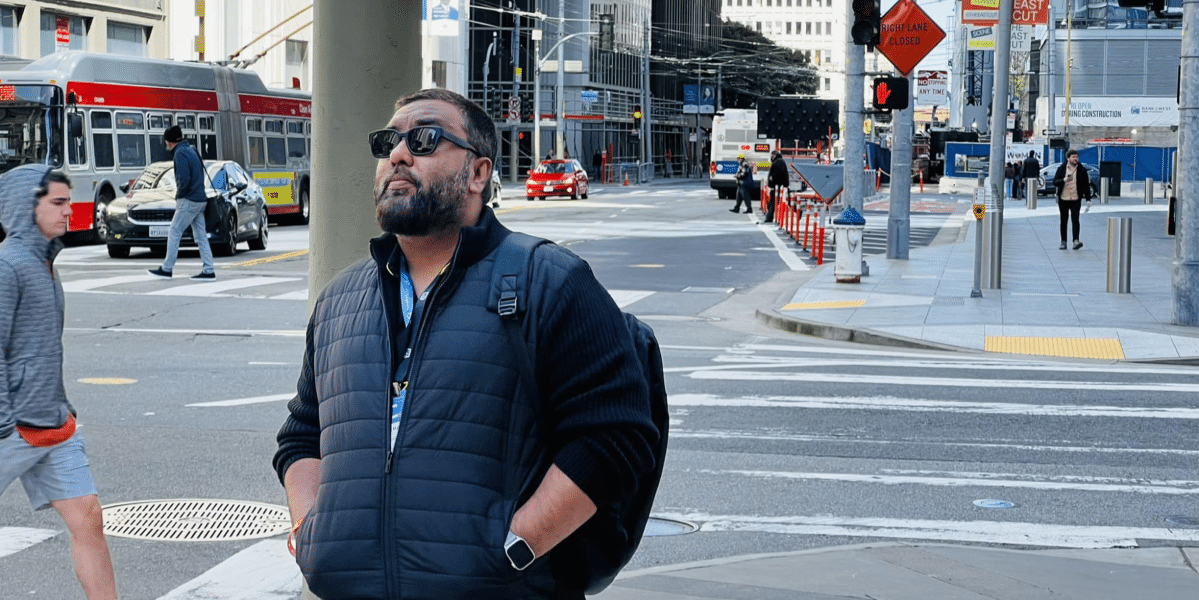By: PR Fueled
Mudassir Saleem Malik, a seasoned technology leader, entrepreneur, and innovator, has over 15 years of experience in driving technological advancements and fostering business growth. With a robust background in IT and technology, he is the CEO of AppsGenii Technologies, a company he founded in 2010. AppsGenii Technologies specializes in delivering cutting-edge solutions like Mobile Apps, Web Development, Robotic Process Automation (RPA), Artificial Intelligence (AI), ERP, CRM systems, and custom software development. The company prides itself on helping clients outperform their competition through tailored solutions that enhance efficiency, reduce costs, and simplify business processes.
Mudassir’s leadership extends beyond AppsGenii. He is also the CTO of GharPar Technologies, a service delivering professional at-home beauty solutions, and a Central Executive Committee (CEC) Member of P@SHA (Pakistan Information Technology Industry Association), where he heads the Industry Engagement and Startup Committee. His dedication to nurturing startups and technology ecosystems has made him a prominent figure in the tech industry of Pakistan and beyond.
Throughout his career, Mudassir has co-founded several successful ventures, including BoxesGen, BlackHoleStudios, Dental Connect, and CodeWorking.co. Each venture reflects his vision to bridge the gap between technology and business by providing innovative solutions and empowering young developers and entrepreneurs globally.
Mudassir’s story is one of perseverance and innovation. Having built businesses from the ground up, he understands the challenges of steering a company through the turbulent waters of entrepreneurship. His journey is a testament to resilience, and he continues to inspire others with his lessons learned in the tech industry, his insights into startups, and his relentless pursuit of excellence.
Q: Malik, thanks for joining us today! First, could you tell us a bit about how you got started in tech and entrepreneurship?
Thank you for having me! My journey in the tech and entrepreneurship space began with a deep fascination for technology and its potential to solve real-world problems. After earning my degree in Software Engineering, I started working with international organizations to gain hands-on experience in software development and IT solutions.
However, I always had the drive to build something of my own. In 2010, I founded AppsGenii Technologies, a company dedicated to providing cutting-edge technology solutions like mobile apps, web development, RPA, AI, and custom software. It was an ambitious move, but I believed in the power of innovation and the idea of creating products that could make businesses more efficient and competitive.
As I navigated the entrepreneurial journey, I realized that startups often need help with scaling and accessing the right expertise. To address specific industry gaps, this led me to build and join several other ventures, such as GharPar, BoxesGen, and CodeWorking.co. Along the way, I joined P@SHA as a CEC Member, leading the Industry Engagement and Startup Committee to empower other entrepreneurs and drive the growth of Pakistan’s tech ecosystem.
For me, entrepreneurship is about resilience, innovation, and collaboration. Each step has taught me invaluable lessons, and I’m always excited about new opportunities to grow and give back to the community.
Q: What was your first startup experience like? Were there any major hurdles you faced as a co-founder?
As one would describe it, the first time was not a walk in the park. We started AppsGenii Technologies in 2010 and operated out of a small office. My partner Adnan Tahir, currently the CTO, and I were doing several things simultaneously. As a co-founder, you’re not just managing technological or commercial aspects. You have to do coding, customer service, etc. Probably the most difficult thing that we encountered was the question of financing. It was challenging for us as first-time founders to convince investors to fund our ideas. And, oh yes, the so-called social life when one is expected to hold down a job that requires 12+ hour work days. But now I realize that all those obstacles were very good lessons.
Q: Regarding co-founding, what qualities do you think are essential in a co-founder relationship?
That’s a great question! A strong co-founder relationship is built on a foundation of trust, shared vision, and complementary skills. In my case, I’ve always been very fortunate. Trust is essential because, as co-founders, you’re navigating uncertain and challenging times together and need to rely on each other implicitly.
Having a shared vision is equally important. It ensures alignment on the company’s goals, values, and long-term direction. Misalignment of vision can lead to friction, so clear communication about expectations and aspirations is crucial.
Complementary skills are what truly make a co-founder relationship effective. For instance, one co-founder might excel in technology and product development, while the other might specialize in business strategy, marketing, or operations. This balance lets each person focus on their strengths and ensures the startup is well-rounded.
Lastly, I believe adaptability and mutual respect are key. Startups are dynamic, and circumstances change rapidly. Co-founders must be open to new ideas and respect each other’s perspectives, even when disagreeing. A successful co-founder relationship is a partnership where both individuals work towards a common goal, support each other, and grow together.
Q: Startups can be notoriously difficult. What do you think is the secret to creating a successful one?
Frankly, I don’t believe there is some sort of magic bullet. But I think resilience is the closest thing. There are many successes and failures in startups, and if a person is not very persistent, they will get bored quite quickly. You also need to be able to commit and shift if you have to. Of course, if your first plan is not going to work, it does not signify the end of your start-up; it just indicates a shift. They are; I have also realized that a strong team should be put in place. As much as it can be fulfilling to do everything yourself, it is impossible, and having a team that buys into the vision and executes it is vital.
Q: As someone who’s seen the startup ecosystem grow and change, how do you think it’s evolved over the years?
The startup ecosystem has evolved significantly, especially in Pakistan. It’s still nascent, with startups, VCs, incubators, and accelerators actively learning and gathering insights. When I started, resources were scarce, and the community was much smaller. Now, there’s a broader network with more incubators, accelerators, seminars, and opportunities for collaboration.
The culture has also shifted positively. A decade ago, failing at a startup was seen as a major setback, even a stigma. Today, failure is viewed as a badge of experience—proof that you’ve taken risks and learned valuable lessons. Globalization and remote work have dramatically improved accessibility, opening new avenues for innovation and growth.
Q: Speaking of failure, have you experienced significant setbacks, and how did you handle them?
Oh, absolutely. In the case of producing his locally-promoted album, the company’s failure is part of the process. It’s been possible for me to start so many start-ups that they never really got going and then engage in projects that are simply an abysmal failure. I mean, it stinks when you give your best, and it does not pan out how you wanted. But with each failure I made, I learned something new, and this gave me the courage to spend more time and build more things around me. I actually took the liberty to invest my time, experience, and money in a few companies, including Aventrio, CodeWorking, BoxesGen, Nexos, and BlackHoleStudios. I also became CTO for Gharpar, a women’s startup run by Shameelah Ismail.
Most importantly, I learned that failure is not fatal if you do not quit. You can’t afford to break. You must learn to get up, assess the loss or failure, and continue. Getting back to normal life is also crucial; people on your team, mentors, or family can help you get your sights back on track.
Q: What role has mentorship played in your entrepreneurial journey?
Mentorship has been invaluable. A very common issue for an “Entrepreneur” when you are in the trenches of creating a new startup is that he can easily forget about the forest, seeing only trees. It is beneficial to have experienced professionals on your side to guide you and show you how to steer clear of the traps and aim for success. I was fortunate that I got connected with some of the best of the best. These mentors give us business guidance and express their feelings about being entrepreneurs. The best advice I give new founders is to seek advisors you can rely on for accurate advice and support, especially during tough times.
Q: What’s the most rewarding part of being an entrepreneur, especially in the tech space?
The most satisfying thing is realizing an idea, from the design to the creation of the product. That sense of beginning with an idea on paper and then slowly seeing it transition into something that has legs and can actually improve people’s lives – is rewarding. And another popular category that people often mention is the technology sector, and, of course, the joy of its growth does not stop. This is always ever-changing. Hence, you never stay behind with what you are dealing with. It lets you allocate and develop someone’s potential; the future belongs to those willing to work for it. In addition, the idea of being on your own as an entrepreneur and the flexibility offered are incomparable.
Q: Finally, What advice would you give aspiring entrepreneurs looking to co-found their startup?
First, I will add that we should not wait for the perfect ‘moment’ to occur. The only truth about business is that there is no right time to start a business. If you ever have the germ of an idea that you feel is worth starting up, go ahead and begin that process. Second, the right people – the ones with whom you’re going to build your company, hire your first employees, or discuss your first investments. Starting and developing a business is not easy, so you require some support system. Third, it should be noted that engagement is not a one-off event but a process that takes time. It will not be a day when you wake up and become successful; you will have many bad days. However, if you continue to be determined and continue to study your previous failures, success will not be far away.
Published by Charlie N.








